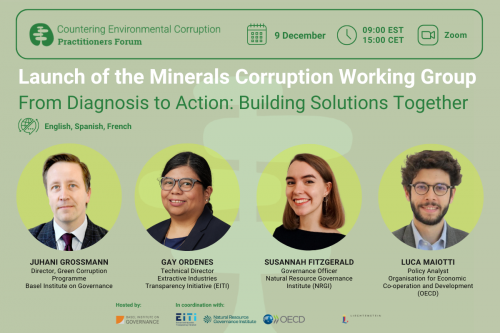The changing face of corruption and security: Munich Security Conference 2024

Corruption was on the main programme of the Munich Security Conference on 16–18 February 2024 for the first time.
Gretta Fenner, Managing Director of the Basel Institute on Governance, moderated a panel discussion featuring Bernardo Arévalo, President of Guatemala, Nikolai Denkov, Prime Minister of Bulgaria, Ketakandriana (Ke) Rafitoson, Vice Chair of Transparency International and Sheldon Whitehouse, U.S. Senator and Chairman of the Senate Committee on the Budget.
The main challenge in Gretta Fenner’s closing words, referring to the theme of this year’s conference report “Lose-Lose”:
“If we do not understand, acknowledge and then act accordingly in relation to the critical role of corruption undermining everything to do with stability, global governance and international law, we will have a lose-lose situation. And we cannot allow that to happen.”
Beyond classical corruption
The Munich Security Conference's decision to include corruption as a “spotlight” in the conference programme, together with other non-traditional security topics such as sexual violence, climate finance and mineral supply chains, was highly welcome. It coincides with a rise in recognition and concern over strategic or "weaponised" corruption as a threat to national, regional and global security and peace.
As Fenner emphasised at the outset, corruption even in the narrow sense of bribery must be of great concern to the defence and security community. When kickbacks or other bribery schemes lead to the purchase of the wrong military equipment, to the construction of substandard infrastructure, or to half the ordered ammunition missing, it has direct and potentially deadly consequences.
What we must also talk about more is the use of corruption for longer-term (geo) strategic goals. In other words, when corruption is used as an instrument – indeed a weapon – of power and influence at home and abroad. And when, as a consequence, it completely evades and thereby undermines global governance and international law.
The result, in the words of Ke Rafitoson, is “an escalation of violence and conflicts around the world.” Corruption has long been seen as a “soft governance” issue, she said, but now:
“We have to recognise that corruption has become a global threat.”
Vicious cycle: state capture and transnational organised crime
Take just about any case of state capture – when power is consolidated in the hands of a few elites, who misuse state institutions to serve their own narrow purposes – and you can trace how corruption is wielded as a highly functional tool to gain and preserve power and influence.
That pattern is clearly visible in Guatemala, where President Arévalo’s recent election success owes much to popular unrest over corruption and to his personal anti-corruption campaigning. Corruption has penetrated every arm of the state over the last 20 years, he explained. Money stolen through corruption is used to empower criminal elites, who then further capture the political system in order to extract more rents – and on it goes in a vicious circle.
That has serious implications on peace and stability far beyond Guatemala as it emboldens and empowers transnational organised crime, he said, including the trafficking of drugs, humans and wildlife.
“When you have corrupt officials, they are quite open to the type of big-money incentives that transnational organised crime can put on the table. On the other hand, transnational organised crime is interested in pushing politicians into office.”
In the end, you find the entire governance of countries is in the hands of corrupt actors and of criminal groups. Driven by the transnational nature of organised crime, this can quickly lead to entire regions descending into a vicious circle of illegitimate governance and crime, and eventually into ever greater instability and violence.
Control over critical sectors
Much concern over strategic uses of corruption for geopolitical purposes also centres on foreign states gaining influence over sectors that are critical for sovereignty, security and stability, such as energy, water and minerals. Historical links and geographical proximity to kleptocratic states increase a country’s vulnerability.
Bulgaria has recently struggled with exactly that phenomenon. Noting parallels with Guatemala’s experience of state capture and organised crime, Prime Minister Denkov emphasised that corruption was not just used as a way for individuals to make money for narrow personal gain:
“Along with classical corruption schemes, you have another type of corruption at a huge scale that affects all aspects of our lives.”
Russia-related energy deals in Bulgaria have wasted more than a billion euros, Denkov said, and resulted in little except total energy dependence on the aggressive autocratic Russian regime. It is clearly a security concern when corrupt deals result in a foreign state gaining power over critical sectors such as energy – not least when they involve sensitive installations such as nuclear power plants.
On the positive side, an anti-corruption focus is leading Bulgaria towards a much brighter future, not only in terms of its energy independence but also more broadly in terms of the quality of its governance, of rule of law and of its role in protecting the Euro-Atlantic alliance. In the last two years, with parties in government who subscribe to the fight against corruption, the country has succeeded in removing oil and gas dependence with strategic and transparent energy arrangements. It is also working persistently towards freeing other sectors from state capture.
Bulgaria’s example shows how political commitments to transparency, participation and anti-corruption can help countries loosen the grip of corrupt states on sectors critical to their security.
How anti-corruption and security communities can join forces
Anti-corruption and defence/security communities often work in bubbles, but closer collaboration could bring benefits to both sides.
Anti-corruption tools and knowledge
Despite legitimate concerns about foreign power and influence through corruption, it’s not helpful to see corruption purely as a foreign threat. Many countries need to do more to prevent corruption and illicit financial flows domestically, since these ultimately threaten both their own and global security.
Tried and tested anti-corruption tools are essential to get one’s own house in order. Senator Whitehouse gave a powerful description of how the U.S. introduced a series of anti-corruption reforms following the realisation that:
“We were the problem. The greatest location for hiding corruptly obtained assets was the United States of America. So we began to take that apart.”
Apart from basic transparency measures like beneficial ownership registers, priorities for many states should include cracking down on enablers such as unscrupulous lawyers and accountants. These are often based in high-income jurisdictions but are key to enabling corruption in other countries.
Senator Whitehouse also testified to the usefulness of working with civil society in devising and implementing the anti-corruption reforms.
Likewise, in general security policy making could benefit greatly from the knowledge and analysis of specialist anti-corruption organisations whose understanding of connections between corruption and security, and related data, facts and reports, can support security-related decision making.
Embedding anti-corruption across the functions of state
Beyond applying tools in specific areas, panellists concluded that states need to embed anti-corruption as a strategic priority across all aspects of security in its widest sense – from procurement to peace building to the development of strong and independent institutions.
The U.S. designation of corruption as a core national security issue has helped to “put corruption higher up the agenda,” said Senator Whitehouse. This is vital because, as President Arévalo also emphasised:
“We were used to corruption being a problem of bad administration…. Now we are seeing political criminal cliques organising to take control of state institutions in order to make them work for corruption. This is a fundamental threat to the viability of democratic states. It is beyond a threat to the security establishment.”
Ukraine’s experience also shows that anti-corruption needs to be elevated as a core and state-wide security issue. Reacting to the panel discussion, Ukrainian anti-corruption activist Hanna Hopko explained that while Ukraine has made significant progress on fighting corruption since the 2014 Maidan Revolution, the illegal invasion of Ukraine by Russia has propelled corruption to the top of the country’s priorities:
“Russia’s aggression against Ukraine has redefined the struggle against corruption. In the past, we considered the fight against corruption to be about… eliminating kickbacks, [money laundering in] offshore jurisdictions, vanity construction projects… [Now] it is crystal clear that without strong institutions, producing strong policies and implementing them, anti-corruption means nothing.”
In other words, Ukraine can only win this war if it wins the war against corruption and builds strong, independent institutions resilient to external attempts to corrupt and control them.
A tough fight ahead
Guatemala and Bulgaria are just two countries facing a tough fight ahead to dismantle corrupt systems and create a well-governed state that works for the people. Legal reforms are important but not sufficient, stressed Denkov.
“You have to have the people. It is not only the leaders. In every position you have to have a person who is willing to fight every day.”
Those people will need a lot of energy, said Senator Whitehouse:
“For the corruption machine, maintaining corruption is life or death. You take away their corruption, there goes their money, there goes their power, their limousines, there goes everything. So they fight to defend it with determination…. The energy and persistence and determination of the corrupt needs to be matched by similar energy, persistence and determination of those trying to root out corruption.”
And that energy can only come from the recognition that corruption is, according to “is no longer [just] a nuisance. It is a direct political threat,” according to President Arévalo.
“Until we do not recognise that, we are not going to really be able to muster the energy, imagination and commitment at the international level to fight corruption effectively.”
Learn more
- See the full recording on the Munich Security Conference website.
- See related articles on corruption and peace building and on how corruption fuels insecurity by affecting power.



